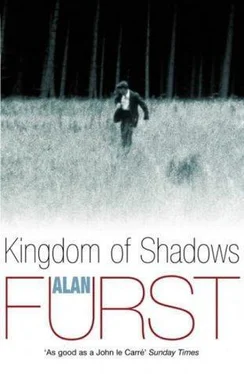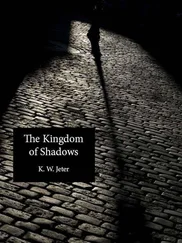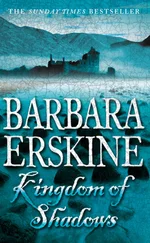Alan Furst - Kingdom of Shadows
Здесь есть возможность читать онлайн «Alan Furst - Kingdom of Shadows» весь текст электронной книги совершенно бесплатно (целиком полную версию без сокращений). В некоторых случаях можно слушать аудио, скачать через торрент в формате fb2 и присутствует краткое содержание. Жанр: Шпионский детектив, на английском языке. Описание произведения, (предисловие) а так же отзывы посетителей доступны на портале библиотеки ЛибКат.
- Название:Kingdom of Shadows
- Автор:
- Жанр:
- Год:неизвестен
- ISBN:нет данных
- Рейтинг книги:5 / 5. Голосов: 1
-
Избранное:Добавить в избранное
- Отзывы:
-
Ваша оценка:
- 100
- 1
- 2
- 3
- 4
- 5
Kingdom of Shadows: краткое содержание, описание и аннотация
Предлагаем к чтению аннотацию, описание, краткое содержание или предисловие (зависит от того, что написал сам автор книги «Kingdom of Shadows»). Если вы не нашли необходимую информацию о книге — напишите в комментариях, мы постараемся отыскать её.
Kingdom of Shadows — читать онлайн бесплатно полную книгу (весь текст) целиком
Ниже представлен текст книги, разбитый по страницам. Система сохранения места последней прочитанной страницы, позволяет с удобством читать онлайн бесплатно книгу «Kingdom of Shadows», без необходимости каждый раз заново искать на чём Вы остановились. Поставьте закладку, и сможете в любой момент перейти на страницу, на которой закончили чтение.
Интервал:
Закладка:
Szubl raised his glass. “To the Free Hungary Committee.”
“May it never exist.”
Morath liked Polish vodka, potato vodka. It had a ghost of a taste he could never quite understand. “So, how did you do?”
“Not bad. From the Salon Kitty, on Szinyei Street, two hundred and fifty thousand pengo. Most of it from Madame Kitty, but she wanted us to know that three of the girls contributed. Then, from the nephew of the late, lamented minister of finance, another one hundred and fifty.”
“That’s all? His uncle would steal the wool from a sheep.”
“Too late, Nicholas. The casino got most of it-he’s a candidate for the boat.”
The citizens of Budapest were partial to suicide, so the municipal authority maintained a boat tied up below the Ferenc Josef Bridge. A riverman waited in the bow with a long pole, ready to haul in the night’s jumpers before they drowned.
“What about you?” Szubl said.
“Four hundred thousand from the Gersoviczy brothers. I go out to Kolozsvar tomorrow.”
“Shooting animals?”
“Christ, I hadn’t thought of that.”
“I’m to see Voyschinkowsky.”
” ‘The Lion of the Bourse.’ He lives in Paris, what’s he doing here?”
“Nostalgia.”
“Waiter!”
“Sir?”
“Two more, please.”
A big redhead came gliding by. She blew a kiss, put her hands beneath her breasts and wobbled them, then raised an eyebrow.
“Let me buy her for you, Wolfi. All night, my treat.”
They drank their vodkas, ordered doubles. The dance floor reappeared. The leader of the orchestra had shiny black hair and a little mustache and smiled like a saint as he waved his baton.
“When you begin-n-n-n, the beguine.” Szubl took a deep breath and sighed. “You know,” he said, “what I really like is to look at naked women.”
“You do?”
“No, Nicholas, don’t make fun of me, I’m serious. I mean, I really don’t like anything else. If I could have begun this at fourteen, as my life’s work, as the only thing I did, day and night, there never would have been a reason for me to disturb the world in any other way.
“But, of course, they wouldn’t let me do that. So, now I crowd into trains, make telephones ring, throw orange peels into trash cans, make women buy girdles, ask for change, it doesn’t stop. And, worst of all, on a lovely day, when you’re happy and calm you go out in the street-and there I am! Really, there’s no end to it. And it won’t stop until I take up the space in the graveyard you wanted for your mother.”
The orchestra played the “Tango du Chat.” Morath remembered the song from the bar on the beach in Juan-les-Pins. “Tell you what,” he said to Szubl. “We’ll go over to Szinyei Street, to Kitty’s. Order a parade around the parlor, every girl in the house. Or, a game of tag. No, wait, hide-and-seek!”
“Nicholas. You know, you’re a romantic.”
Later, Morath went to the WC, met an old friend, gossiped for a few minutes. When he came back, the redhead was sitting on Szubl’s lap, playing with his tie and laughing. Wolfi’s voice floated down from the platform. “Good night, Nicholas. Good night.”
At Kolozsvar railroad station, a bright, cold morning.
There were two other Hungarians who left the train with him. Hunters, with shotguns under their arms. The conductor on the platform wished him good morning, in Hungarian, as he got off the train. And the two women mopping the floor in the station waiting room bantered in Hungarian and, in fact, laughed in Hungarian. A pleasant Magyar world-it just happened to be in Roumania. Once Kolozsvar, now Cluj. Nem, nem, soha.
A journey to the estate of Prince Hrubal turned out to be infernally complicated to arrange. It had required, in the end, several medieval phone calls, three telegrams-one of which went, inexplicably, to Wales, a verbal message taken to the castle by a gamekeeper’s daughter, and a personal intervention by the village mayor. But, in the end, it worked.
In the street outside the station, Prince Hrubal’s head groom was waiting for him, mounted on a bay gelding and holding the reins of a dock-tailed chocolate mare. This was, Morath knew, much the best way. You could try the road by automobile, but you spent more time digging than driving, and the trip by horse and carriage would hammer your teeth flat. That left walking and riding, and riding was faster.
He swung up into the saddle and tucked his briefcase under his arm. He’d made sure, in Budapest, to wear boots for the journey.
“Your excellency, I kiss your hands,” said the steward.
“Good morning to you,” Morath said, and they were off.
The good road in Cluj led to the bad road outside Cluj, then onto a road paved long ago, by some nameless dreamer/bureaucrat, and soon forgotten. This was northern Transylvania, mountainous and lost, where for generations Hungarian nobles ruled the lives of Roumanian serfs. There were, now and then, savage jacqueries, peasant risings, and the looting and burning would go on until the army arrived, coils of rope hung on their saddles. The trees were already there. Now, for the moment at least, it was quiet. Very quiet. Out in the countryside, a ruined castle broke the line of a mountain crest, then there was only forest, sometimes a field.
It took Morath back to the war. They’d been no different than any of the armies who came down these roads on mornings in the fall. He remembered wisps of autumn mist caught on the barbed wire, the sound of wind in the stubble of the rye fields, the creak of harness, crows wheeling in the sky and laughing at them. Sometimes they saw geese flying south; sometimes, when it rained at dawn, they only heard them. A thousand horses’ hooves rang on the paved roads-their coming was no secret, and the riflemen waited for them. Once there was a sergeant, a Croat, adjusting a stirrup in the shade of an oak tree. The air cracked, an officer shouted. The sergeant put a hand over his eye, like a man reading an eye chart. The horse reared, galloped down the road a little way, and began to graze.
Prince Hrubal owned forests and mountains.
A servant answered Morath’s knock and led him to the great hall-stag heads on the wall and tennis racquets in the corner. The prince showed up a moment later. “Welcome to my house,” he said. He had merciless eyes; black, depthless, and cruel, a shaven head, a drooping Turkish mustache, the nickname “Jacky,” acquired during his two years at Cornell, a taste for Italian fashion models, and a near manic passion for charity. His bookkeeper could barely keep track of it-broom factories for the blind, orphanages, homes for elderly nuns, and, lately, roof repairs on ancient monasteries. “This may do it for me, Nicholas,” he said, a heavy arm draped around Morath’s shoulders. “I’ve had to sell my sugar contracts in Chicago. But, still, the contemplative life must be lived, right? If not by you and me, by somebody, right? We can’t have wet monks.”
The baroness Frei once told Morath that the prince’s life was the story of an aristocrat of the blood seeking to become an aristocrat of the heart. “Hrubal’s a little mad,” she said. “And it remains to be seen if his wealth can accommodate his madness. But whatever happens, these are thrilling races to watch, don’t you agree? Poor man. Thirty generations of ancestors, brutal and bloody as the day is long, roasting rebels on iron thrones and God knows what, and only one lifetime for redemption.”
The prince led Morath outside. “We’ve been moving boxwood,” he said. He wore high boots, corduroy field pants, and a peasant blouse, a pair of cowhide gloves in his back pocket. At the end of the lawn, two peasants waited for him, leaning on their shovels.
Читать дальшеИнтервал:
Закладка:
Похожие книги на «Kingdom of Shadows»
Представляем Вашему вниманию похожие книги на «Kingdom of Shadows» списком для выбора. Мы отобрали схожую по названию и смыслу литературу в надежде предоставить читателям больше вариантов отыскать новые, интересные, ещё непрочитанные произведения.
Обсуждение, отзывы о книге «Kingdom of Shadows» и просто собственные мнения читателей. Оставьте ваши комментарии, напишите, что Вы думаете о произведении, его смысле или главных героях. Укажите что конкретно понравилось, а что нет, и почему Вы так считаете.












